How to Free Range Chickens
If you are new to raising chickens and still trying to figure out all you need to have and do, then this post will help. Know just how to free-range chickens along with the pros and cons, what to have for protection, food, water, and more.
Raising chickens that are healthy and happy is always our goal. Happy chickens in our backyard means more eggs in our kitchen.

Have you ever driven down a country road and noticed chickens slowly walking around the front yard of a quant farmhouse? It’s funny to watch them slowly make their way from one side to the other in a haphazard path that only they know. They seem to be pecking at the ground clawing the grass as they do. What are they doing?
When a chicken rakes its feet over the grass they are scratching the ground. This is a technique they use to bring any bugs or worms closer to the surface so they can get to them more easily. Scratching is a soothing activity that helps a chicken not only find food throughout the day but it also helps them to relax in a way that keeps them happy and healthy.
The Benefits of Free-Ranging your Chickens
Free-ranging your chickens has a lot of benefits the most important being access to fresh ground, loads of sunshine, and fresh air. Something they may not be able to find as easily inside of a chicken coop or run.
Should you free range your chickens?
When chickens have access to fresh air and sunshine, they are happier and healthier. And when they can enjoy the bounties of nature, such as bugs and worms, they’ll produce healthier eggs.
One of the reasons why many folks have a flock of chickens is for those amazing eggs. Home fresh eggs have cholesterol and fat content that is lower and the Omega-3 and Vitamins A and E content are much higher. Home fresh eggs will not only be healthier, but they’ll also be tastier.
Free-ranging has a calming aspect to it and that means your chickens will be happier and, in turn, healthier so they produce amazing eggs routinely throughout the year.
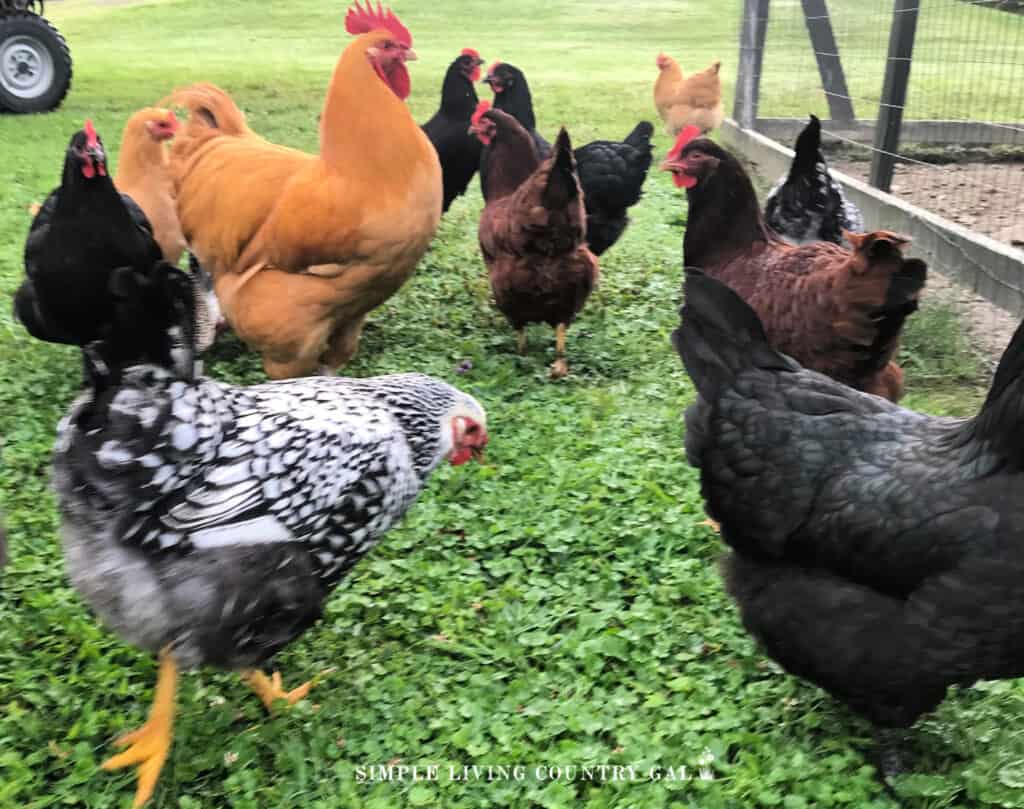
Allowing your chickens to forage for themselves means a reduction in feed costs and fewer bugs around your home, and possibly, your garden. Free-range chickens can also give your garden a boost by not only eating bugs and pests but they will also scratching up weeds, creating a healthier environment in your garden.
A note about free-ranging chickens near a garden. Chickens are non-discriminative foragers and will just as easily scratch up vegetable plants in your garden as they will weeds. For that reason, you will want to fence your gardens during growing seasons to help keep all of your plants safe.
Giving your chickens a little more space will also keep them healthier with fewer diseases and parasites, but not only that, overcrowding can cause some behavior problems such as hen pecking and feather picking. Overcrowding can also create a stressful atmosphere and stress is a gateway to diseases that can quickly spread throughout your entire flock.
If you’re thinking about free ranging though, there are a few things to consider, especially if you live in a suburban area.Chickens do like to wander so you’ll need a good-sized yard, but they usually don’t travel far from home. They prefer to stay close to their reliable food and water source as well as their protected coop. Keeping the coop clean and keeping the feeders filled will keep them from roaming too far. You’ll also want to provide a dust bathing area and perches. Chickens are curious birds and get bored easily, the more freedom they have to roam and places they have to hang out, the happier they’ll be.
Having a fenced-in yard may not keep your chickens at home, but it will help. Providing them with everything they need at home will also encourage them to stay close. Either way, it’s still a good idea to talk to your neighbors especially if they live in close proximity. Make sure they know you have chickens in case they go wandering, and if they do your neighbors will know who to call.
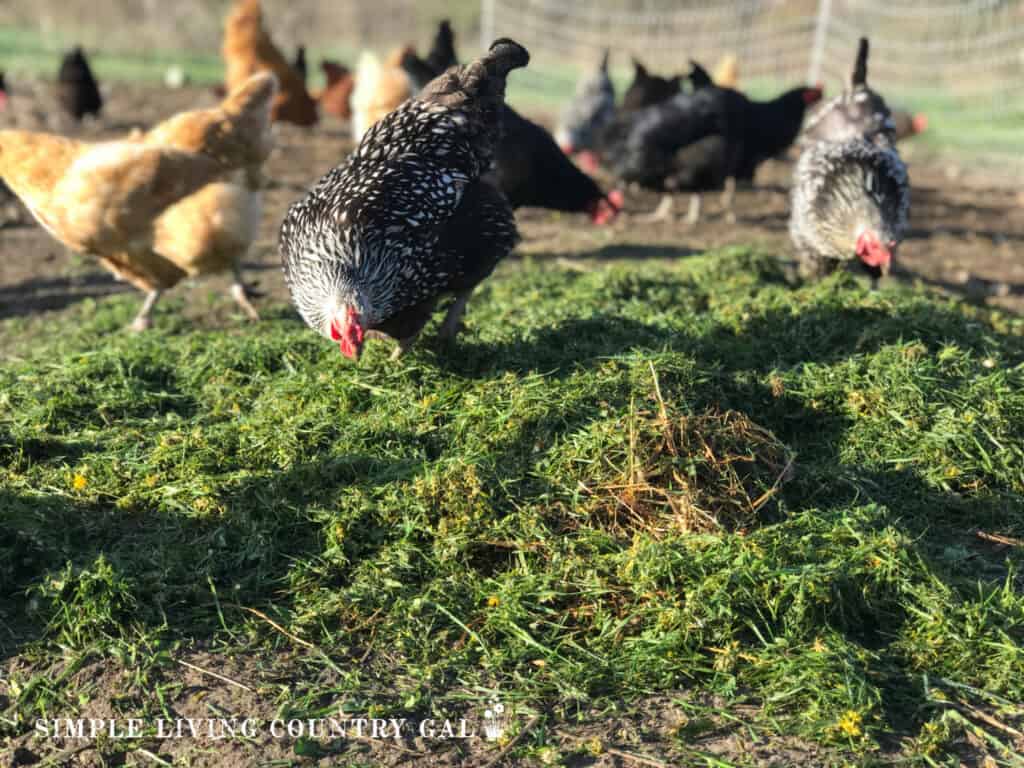
Pros and cons of free ranging your chickens:
Pros of free ranging chickens:
· Eggs will taste better and be more nutritious. Free range chickens produce eggs with darker yolks which provide more flavor. They’ll also pick up more nutrients from what they forage on their own which will be passed on to the eggs.
· You won’t need to buy as much chicken feed. If your chickens are foraging all day on what they find in your yard, they won’t be consuming as much feed.
· Free range makes happier, healthier chickens. Foraging provides great activity and keeps them from getting bored, as well as giving them plenty of exercise.
Cons of free ranging chickens:
· Your neighbors might not appreciate it. If your neighbors aren’t friendly or they don’t want your chickens roaming their property, you might have no other choice than to cage them. Your chickens may also be in danger from neighborhood dogs that aren’t trained to be around chickens.
· You may not get as many eggs. Free range chickens may lay eggs somewhere other than their coop which means you may find eggs all over your yard or discover a huge stash one day behind your shed. If your reason for keeping chickens is solely for the eggs, you may want to consider keeping them closer to home.
· Predators can be a problem depending on where you live. Hens are defenseless against predators so it’s a good idea to keep a rooster, although you run the risk of losing him if he fights a predator to protect the hens. Either way, you’ll want to protect your chickens from predators as much as possible.
How to Free Range Your Chickens
You can offer your chickens two types of free range; supervised free range and complete free range. No matter which approach you choose you will want to have a safe and secure coop to put your entire flock into each night. One that is closed up and protected from the weather and any outside predators. You will also want to have an enclosed run for any days where free ranging is not an option.
Free range with supervision.
This type of ranging is done while someone is outdoors or at least nearby. This can be done while you are doing another task such as working in the garden or cleaning out the barn. With supervision, you can let your chickens out of the coop to run freely. This is the best option for a protected free range experience.
Free range without supervision.
Complete free range will give your flock access to browse throughout the entire day. This is a great way to raise happy and healthy chickens but it does open them up to danger from predators. Each morning as you are doing chores you open up the coop allowing your flock to come and go as they please. Each evening, do a head count and call in any hens that have not returned to the coop.
Limited free range.
Limited free range is what we do on our homestead as I feel it allows the best of both words. Our chickens are given access to a large area yet they are enclosed so nothing outside can easily get at them. You can purchase netting for chickens online in all sizes. Another benefit of limited free ranging is you can choose where you want your chickens to be. This means you can rotate them all over your yard keeping vegetable gardens and ornamental plants safe.
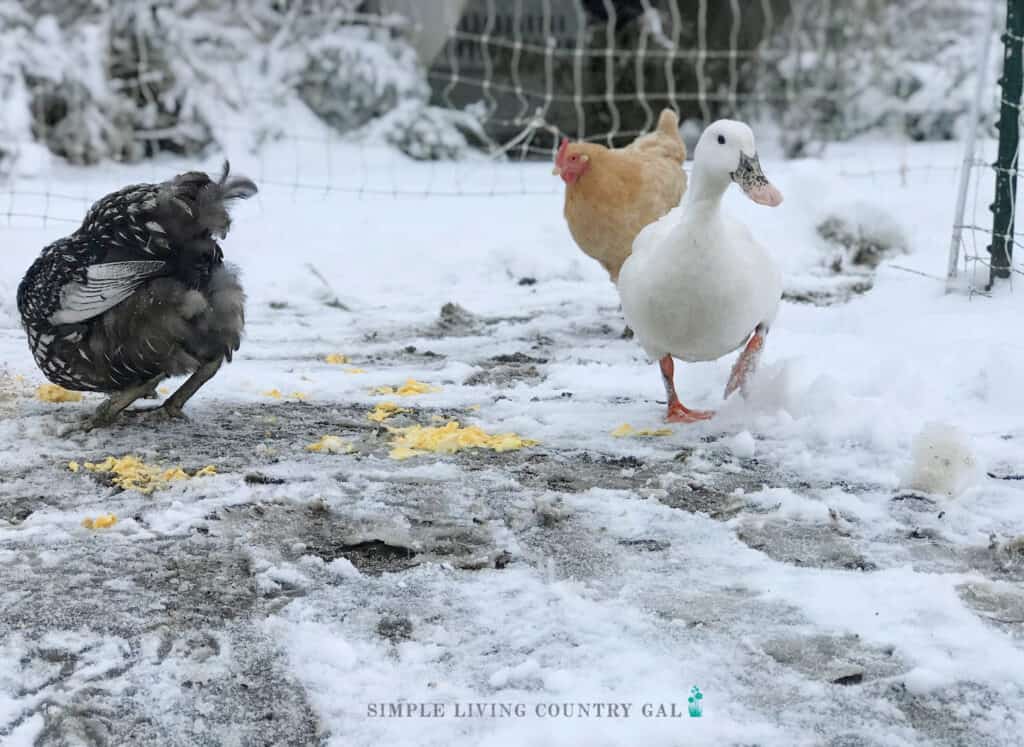
Predators can be a problem during the day as well and even supervised free range won’t protect your backyard chickens completely. If you have rare chickens or consider them as pets, free ranging is probably not for you. The reason is when you allow animals to come and go without adequate protection there will occasionally be a loss.
You can help to keep them safe and reduce predator attacks with a few simple tips:
· Tree and shrub cover will help to protect your chickens from overhead predators like hawks and eagles. Unfortunately, these can also make ideal hiding places for small animals such as a fox or coyote.
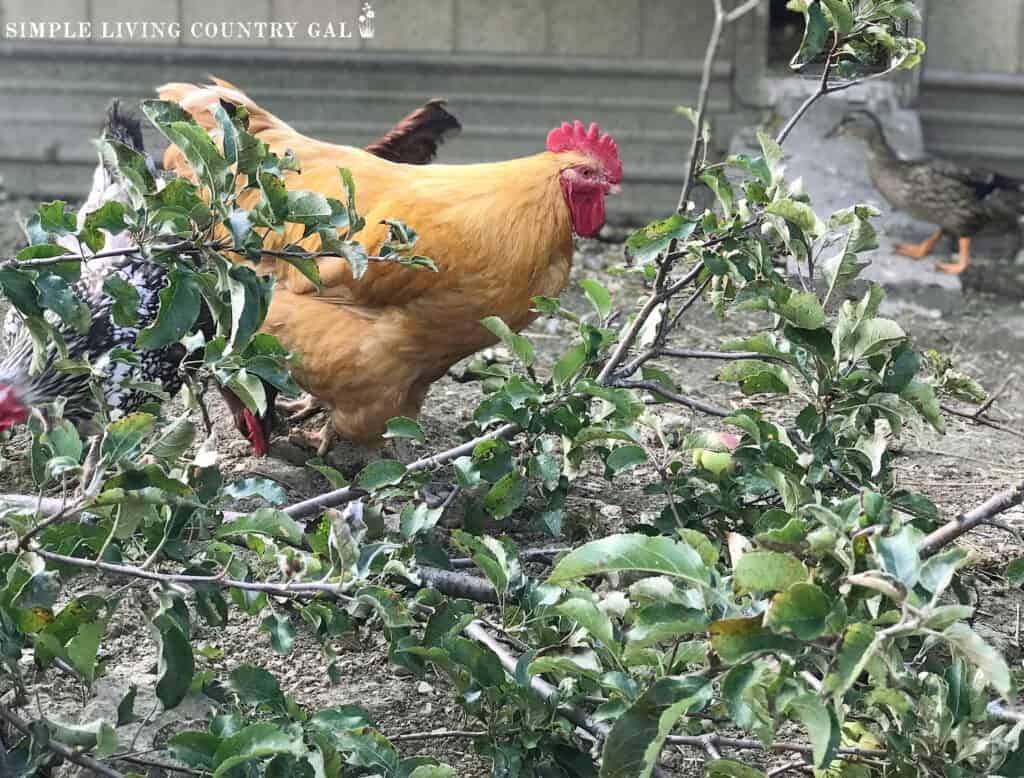
· Keep the coop and run clear of vegetation so that you have a clear visual field of about 20 to 25 feet around their housing area.
· Visit your chickens frequently throughout the day. Some predators, like fox, like to watch for a while before they attack. Visiting often can disturb a predator’s sense of security deterring them from bothering your flock.
· Consider a livestock guardian for added protection. Having a dog, cat, or even a donkey will discourage predators from coming around.

· Add a rooster to your chickens. Not only will he do whatever he can to protect every hen in the flock he will squawk loudly when danger is present which will alert you that something is up.
· Erect a temporary or permanent shelter that provides cover. Whether you let your chickens free range inside a large caged in area or you simply lay a tarp over some stakes in the ground, the cover will help to reduce predator attacks.
· Use a movable fence such as netting to protect a free range area when your chickens are out.
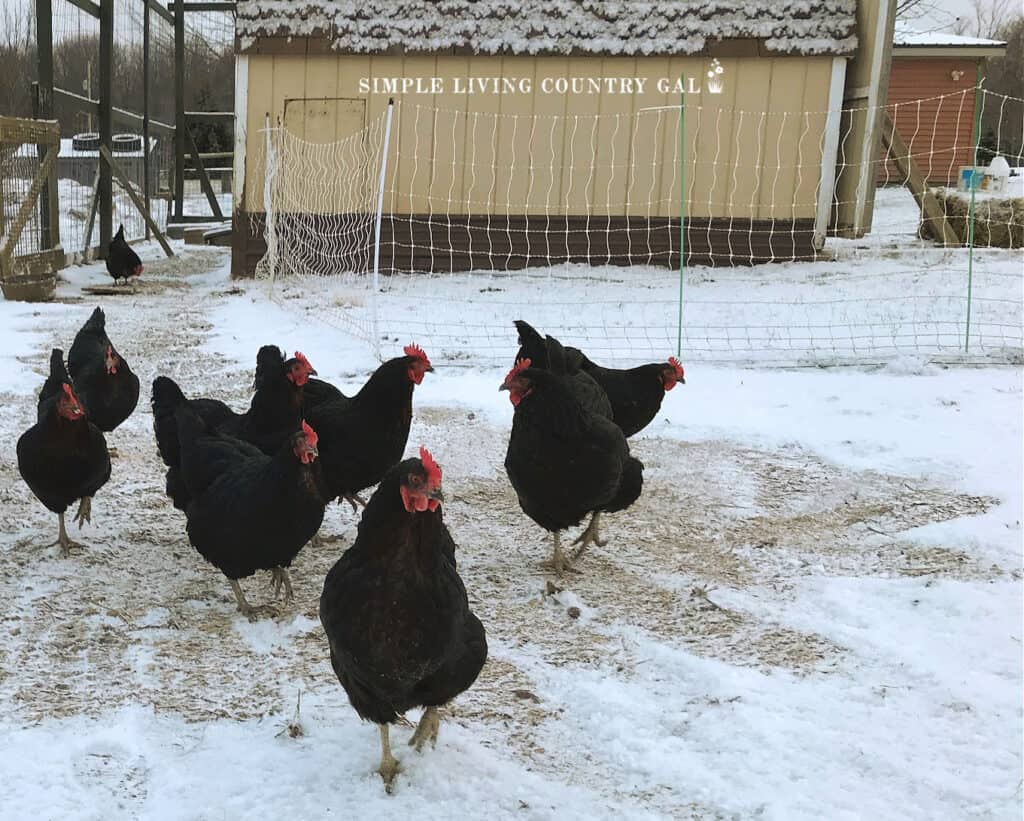
If you’ve decided that free ranging isn’t for you, a chicken run might be your best option. It’s bigger than a coop and provides more protection and confinement than free ranging.
If you’re going to opt for building an enclosed chicken run, make sure you provide plenty of food scraps to allow them to do some foraging throughout the day. Some entertainment like chicken swings and hanging mirrors will keep them busy, you can also find various types of hanging treats for them. It’s also important to provide an area for a dust bath and make sure they’re getting plenty of sunlight.
If you do not have a chicken coop yet, you can use these plans for a great backyard coop!
You can also boost the nutrient level of the eggs by giving your chickens vitamins, kelp, or apple cider vinegar.
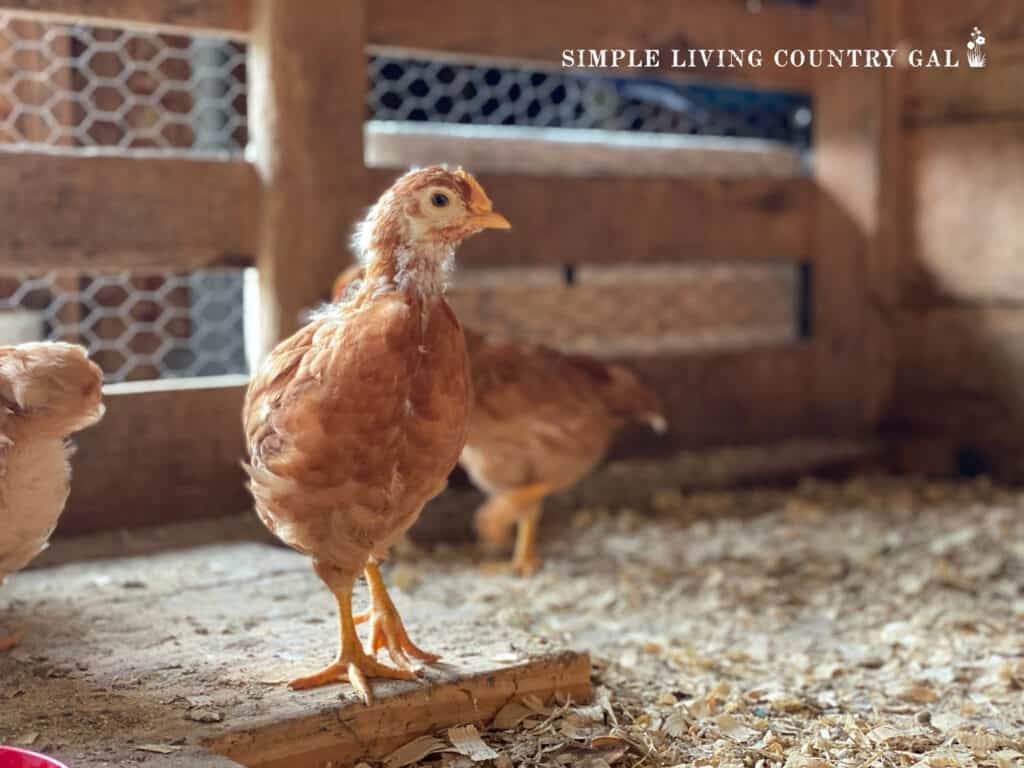
There are a lot of things to consider before deciding to free range your chickens. It’s best to create a plan that includes how you’ll protect them, what they’ll eat, and how far they can go before making the final decision.
If you’re able to offer your chickens free range, they’ll be happier in their environment and they’ll provide tastier and healthier eggs for you and your family.
I hope you found this article helpful on how to free range your chickens so you can raise chickens that are healthy and happy all year long.
